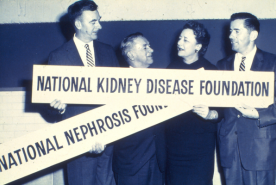Medicare tips for kidney patients
Once a year, you should review your Medicare plan to see if there are any changes that will affect your coverage for the following year.
People with kidney disease are eligible to apply for a Medicare Advantage plan! MA Plans provide all your Medicare Part A and Part B benefits and also often offer additional coverage benefits to their members such as prescription drug coverage or dental benefits. Often MA plans have strict in and out of network coverage areas and may require a co-pay for clinic visits. It is important that you make sure your dialysis facility and your transplant center are in-network with the MA plan you choose. It's important to learn as much as you can about what the MA plan covers to make sure it will meet your needs. Learn more about MA Plans.
Learning about insurance options and choosing a plan that is right for you can be confusing and overwhelming. The National Kidney Foundation has created this resource guide to help you learn more about insurance.
For people with kidney disease your insurance options may change as your kidney disease progresses. For example, when someone starts dialysis or has a kidney transplant they can apply for Medicare. Typically, Medicare is an insurance option for people over 65 years old, but there is a special entitlement for people who have kidney failure - also known as End Stage Renal Disease (ESRD). Medicare pays 80% of the cost of dialysis treatment and 80% of the cost of immunosuppressant medications after transplant.
Insurance Options for Kidney Patients
Additional resources
- Insurance Options
- Medicare Basics
- FAQ About Medicare
- FAQ: Expanded Medicare Coverage of Immunosuppressive Drugs for Kidney Transplant Recipients
- Special Considerations for People on Dialysis or Kidney Transplant Recipients
- New in 2022: Medicare Advantage Plans for Kidney Patients
- Common Insurance Terms Defined








